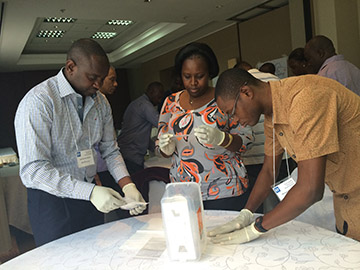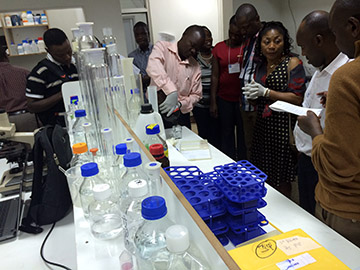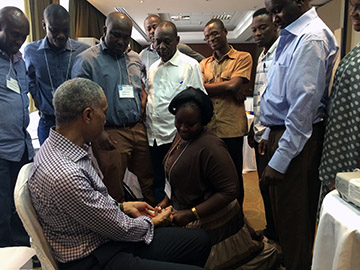Training the Next Generation of DHS Program Biomarker Consultants
In January, 2015, 11 biomarker specialists from 8 countries met in Uganda to participate in the first-ever South-to-South DHS Program Biomarker Workshop. Participants all had previous experience with DHS surveys, either as consultants or as in-country staff. The objectives of the training were to emphasize mastery of technical biomarker content and training materials, strengthen consultants training and facilitation skills, and to pilot test the newly designed DHS Program Biomarker Curriculum. Ultimately, it is hoped that many of the participants from this workshop will be able to serve as DHS Program biomarker consultants for future surveys.
There were many lessons learned from the training. For example, while DHS Program staff have been training biomarker specialists in survey countries for decades, their training has been limited to their specific role in one country. The new biomarker curriculum is broader, allowing biomarker consultants to see how biomarker data collection fits into the larger survey process, and which aspects of the standard methodologies are applied in all survey settings.
Bakunda Kamaranzi, a Laboratory Training Coordinator from the Uganda Ministry of Health, elaborates: “I was invited from Uganda, and had a fair understanding of the DHS Program, having participated in more than one DHS survey. In as much as I thought I knew quite a bit about the program, by the end of the first day, I knew and agreed with my colleagues that there was a lot to learn, a lot more that we did not know.”
One of the challenges of training a group of future consultants is that the participants must not just be able to implement data collection protocols and practices, but they must also be able to explain them to dozens of future trainees. This requires that these consultants understand the “why” of the way we do things. Why must the blood drops be totally dry before packing? Why do we wipe away the first drop of blood during a finger prick? Why do we measure younger children lying down? The South-to-South training allowed for a discussion of all this important background information.
Zoulkarneiri Issa (Togo), Jean de Dieu Butura (Rwanda) and Tharcisse Munyaneza (Rwanda) wrote: “En effet, ils nous rappelaient à chaque moment sur notre rôle de consultant et par conséquent, nous devons maitriser tous les contours scientifiques et même épidémiologiques des thématiques à enseigner. Ce qui nous permettra de faire face aux éventuelles questions et préoccupations des autorités sanitaires et administratives des pays où nous serons appelés à consulter.”
English: “In fact, [the facilitators] reminded us every moment of our consulting role and that we were expected to master all the scientific and epidemiological concepts and the teaching thematic concepts. This will enable us to deal with any issues and concerns of health and administrative authorities of the countries where we are called to provide technical assistance.”
Lastly, most biomarker specialists had no previous experience with adult learning techniques; few had been trained in training or facilitation. If The DHS Program hopes to use these participants as future biomarker consultants, they will, in turn, be expected to train all of the in-country biomarker survey staff on biomarker data collection. Simply knowing the technical material is not enough. They will need to know how to train people to do this correctly.

For the teach back exercise, Jean de Dieu Butura, Kamarazni Bakunda, and Mike Amakyi practice proper storage of blood samples.
Bakunda Kamaranzi explains: “Then came the training-of trainers. At the beginning we were introduced to new theories and names; Bloom’s taxonomy, Edgar Dale’s cone of learning, David Kolb’s experiential learning cycle, all which some of us were seeing for the very first time. By the end of the day, we were able to relate the theories to training and it all made a lot of sense. The teaching methods learned in the TOT session were used during the teach-back sessions and, we are better trainers than we were on the 19th of January when we reported to the workshop. The trainers guide will definitely improve the way we deliver Biomarker training for DHS surveys.”
The January 2015 South-to-South Biomarker Training is one of many activities The DHS Program is undertaking to formalize our capacity strengthening efforts, and empower a wider group of experts to assist in the implementation of DHS surveys globally. The reach of these trainings is limitless: as we train our colleagues to be trainers, they can train hundreds more. Ultimately, these South-to-South consultants will be leaders in DHS survey management, and, more broadly, will contribute to improved quality of data collection of other surveys in their region.
Michel Toukam, Lecturer at the Faculty of Medicine and Biomedical Sciences, University of Yaounde, Cameroon, summarizes: “With this workshop, the consultants have acquired more knowledge on adult’s training methodology and techniques (Andragogy), on the DHS gold standards, protocols and procedures. They will form a network of DHS Program consultants in which experiences in learning techniques and follow up of DHS survey biomarker procedures will be shared. They will be more confident when they are leading training sessions in surveys.”
Nsobya Samuel Lubwama, Senior Lecturer at the Department of Pathology, School of Biomedical Science, Makerere University College of Health Sciences in Uganda, adds: “With my laboratory background experience of over 20 years, this workshop was timely to enrich me with new skills by expert facilitators…I am now able to train health laboratory technicians worldwide with very minimum supervision on other biomarkers namely: anthropometry, DBS collection, measuring pressure, blood glucose, Hemoglobin, HIV. I have also been empowered with new knowledge how to plan for survey in advance such as advising the country policy makers on what is needed to collect biomarkers of interest in relation to country specific needs.”




It is very useful training. How i can avail training opportunities.
Je suis actuellement le superviseur médical de EDS-C 2017 du Sénégal. EDS est une enquête pleine d’informations et d’enseignementS. J’ai eu l’occasion de travailler auprès des statisticiens,des démographes, des informaticiens et des consultants d’ICF comme Péter Aka et Magatte ndiaye. C’est toujours un honneur pour moi d’y continuer à participer
I am currently the medical supervisor of EDS-C 2017 Senegal. EDS is a survey full of information and teaching. I had the opportunity to work with ICF statisticians, demographers, computer scientists and consultants like Péter Aka and Magatte ndiaye. It’s always an honor for me to continue to participate